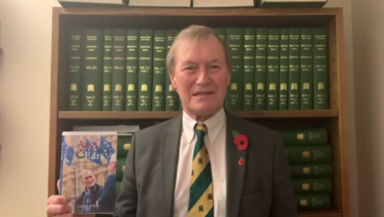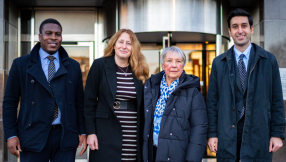
Sir David Amess has been remembered by peers in the House of Lords as a devoted MP whose Christian faith underpinned everything he did.
The Archbishop of York, Stephen Cottrell, was among the peers paying moving tributes to the Tory MP who was murdered in Leigh-on-Sea last Friday.
"He was—and I know this from the work I did with him—a deeply committed constituency MP. He exemplified what that means," said Archbishop Cottrell, who grew up in Leigh-on-Sea.
"He knew the people he served, and in the constituency he was completely colour blind to political difference.
"He just served the people he had been elected to serve."
Cottrell said it was Sir David's love and faith in Christ that underpinned his vision and values, and "enabled him to reach across party-political divides, get on well with everyone and exhibit a good-humoured generosity and a kindness that is, sadly, often woefully lacking in public and political discourse today".
"These same values, this same vision, are held in our democracy," he continued.
"They require us to listen and to love one another, especially those with whom we differ and disagree, and to attend to each other's needs and serve the common good.
"They call us to speak kindly of each other, to think well of each other and to act generously.
"It is because Sir David Amess so exemplified those things, regardless of what his politics happened to be, that we are so easily able to come together and remember him, to esteem his contribution to public life and to mourn his death—but not be defeated by the hatred that killed him."
Baroness Brinton said she could not think of a better example than Sir David of "disagreeing well".
"In political terms, we were polar opposites, but, with him, that was never a barrier: he always found what we had in common, and we could stand together," she said.
"His faith was intrinsic to every action, every word he uttered and every passing smile to faces that he recognised. May he rest in peace and rise in glory."
Lord Alton of Liverpool, a close friend of Sir David's, said "faith was in his DNA" and "animated his belief in public service and the principle of duty".
"David's faith informed his passionate commitment to the very right to life, human dignity and the common good. But it was also rooted in his absolute conviction that an MP's first priority was to their constituents," he said.
Lord Alton echoed pleas from Sir David's family for more tolerance and understanding, as he said people of all faiths and none "must work much harder to create a more respectful society which honours difference".
"Too often we have been in denial about the sources of the hateful threats to the foundations of a liberal, open and pluralistic society," the crossbench peer said.
"As David's horrific death demonstrates, notwithstanding all the good in the world, we still have the capacity to do truly evil things.
"His death reminds us of the deep-seated challenges we face. Above all, it will have devastating consequences for his family and loved ones, and my principal thoughts and prayers today are with Julia and their children. May this good man now rest in peace."
Lord Blencathra said Sir David's "deeply religious" nature "clearly influenced" his political views.
"But he was always capable of seeing the other point of view," he said.
"He always disagreed with the viewpoint, not the person making it; that is a sign of greatness and generosity of spirit. He followed the great commandment of Jesus to love the Lord your God with all your heart, with all your soul and with all your mind, and love your neighbour as yourself.
"Well, David loved 70,000 neighbours —all his constituents in Southend West—and people further afield in the UK and even further afield around the world, as has been said."
He continued, "I say this carefully: I think that David died a Christian martyr. I mean "martyr" in the proper Greek derivation of the term meaning a witness and nothing else.
"He died a witness to his belief in the theological virtues of faith, hope and charity and to their practical realisation, including in working for others until the very end. He did his duty to his God, his family, his constituency and his country. What truer passport is there to eternal life?"













